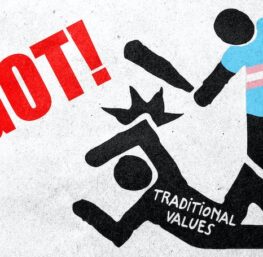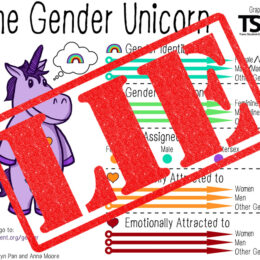A Lincoln middle school staffer gave teachers training documents advising them not to use “gendered expressions” by calling students “boys and girls” or “ladies and gentlemen,” but to instead use more generic expressions like campers, readers, athletes or even purple penguins to be more “gender inclusive.”
A handout called “12 easy steps on the way to gender inclusiveness” advised teachers to avoid separating students by gender, but instead by birth dates or preferences. For example, they could ask students whether they prefer skateboards or bikes, milk or juice, dogs or cats, summer or winter.
“Always ask yourself, ‘Will this configuration create a gendered space?’” said Step 1 of the handout.
Or they could “Create classroom names and then ask all of the ‘purple Penguins’ to meet at the rug,” the handout said.
Step 5: “When you find it necessary to reference gender, say ‘boy, girl, both or neither,” the handout said. “When asked why, use this as a teachable moment. Emphasize to students that your classroom recognizes and celebrates the gender diversity of all students.”
Step 7: “Look for examples in the media that reinforce gender stereotypes or binary models of gender (it won’t be hard; they’re everywhere). When with others, call it out and interrogate it.”
Step 8: “Be intolerant of openly hostile attitudes or references towards others… on their statements about gender. Being punitive may stop the behavior, at least in your presence. Being instructive may stop it entirely.”
Step 10: “Avoid using ‘normal’ to define any behaviors.”
Another playful handout called “The Genderbread Person” said gender isn’t binary, it isn’t either/or and encouraged kids to define their gender based on how much they align with “what you understand to be the options for gender” such as “two-spirit” and “gender/queer.” The options for expressing gender ranged from butch to femme and androgynous to gender-neutral. The handout was written by “social justice comedian” Sam Killermann.
Lincoln Superintendent Steve Joel told KLIN Radio’s Drive Time Lincoln show Wednesday he was “happy” and “pleased” with the training materials because the school district wants all children to be successful and not feel like outcasts or be afraid to go to school. He said the school district needs to be inclusive and educate and understand all children and address bullying.
“We don’t get involved with politics,” he said. “We don’t get involved with gender preferences. We’re educating all kids… and we can’t be judgmental.”
Kids who are “living an alternative lifestyle” or have a “gender difference” are going through an “emotionally traumatic time,” Joel said, and other students “don’t understand what that child represents” so the school needs to help students understand “differences are OK” and “we’re all there to learn.”
Al Riskowski, executive director of the conservative Nebraska Family Alliance, said his group has supported legislation to combat bullying, but the training materials go “way beyond trying to teach someone how to respect another individual” or understand gender identification or sexual orientation to a “whole new idea of boy-girl.”
It was a reteaching of “gender spectrum philosophy,” he said. While he knows it’s hard to be a teacher and school administrator these days and important to address issues, Riskowski said the idea “your biology at birth doesn’t designate who you are,” but instead you’re on a “gender spectrum” is at odds with the beliefs of “almost everyone in the community.”
Joel said the materials were only distributed at Irving Middle School and won’t be disseminated district-wide, because it’s up to each school to determine what their needs are.
“Now obviously there might be a school where this isn’t a conversation and maybe doesn’t need to be a conversation,” he said. “To Irving’s credit, they have children that represent what the discussion points are and they’re helping their faculty understand, give definition.”
As for teachers who may be offended by the training material, Joel said they should “meet with their principal and talk through that.”
Joel said his email inbox is filled with feedback ranging from those who thanked him for being inclusive to “the other side,” but he doesn’t expect the school district will change course. A parent with a student at Irving Middle School sent emails alerting others to the training and asking them to join her and address the issue with the school board Oct. 14.
Joel said in a rapidly growing, diverse school district with 39,000 students — 30 percent of them “children of color,” 43 percent living in poverty and lesbian, gay, bisexual and transgender students throughout — the school district can’t say “we need kids to look like this, or act like this or talk like this.”
“There is no one size fits all approach to this,” he said. “We can’t turn a deaf ear to that. We have to understand it. (That) doesn’t mean we have to approve of it, but certainly we can’t be judgmental inside our schools.”
Asked whether the Lincoln Public School district has a policy for transgender students — such as how they use locker rooms and restrooms — Joel said yes, but that it’s a relatively new “work in progress” that is individualized and worked out between administrators and families. He said “determinations are being made in the best interest of the child,” but they won’t be made public because it’s an emotional, confidential issue.
Riskowski said students should respect each other and not be judgmental, but the school district shouldn’t have to re-educate the 99 percent who aren’t transgender about “the entire idea of boy-girl.” He noted the materials seemed geared to very young children, with references to calling kids purple penguins and getting in line.
He said he’s not aware of similar training in other Nebraska schools, and a sister organization that works on such issues nationwide told him it’s “some of the most radical material we’ve ever seen.”
Irving Principal Susette Taylor told the Lincoln Journal Star she held a staff session on the issue, and the handouts were given out by a staffer on a “district equity team.” She said they were meant for teachers, not students or parents, and were suggestions, not rules, on how to make students feel comfortable.




